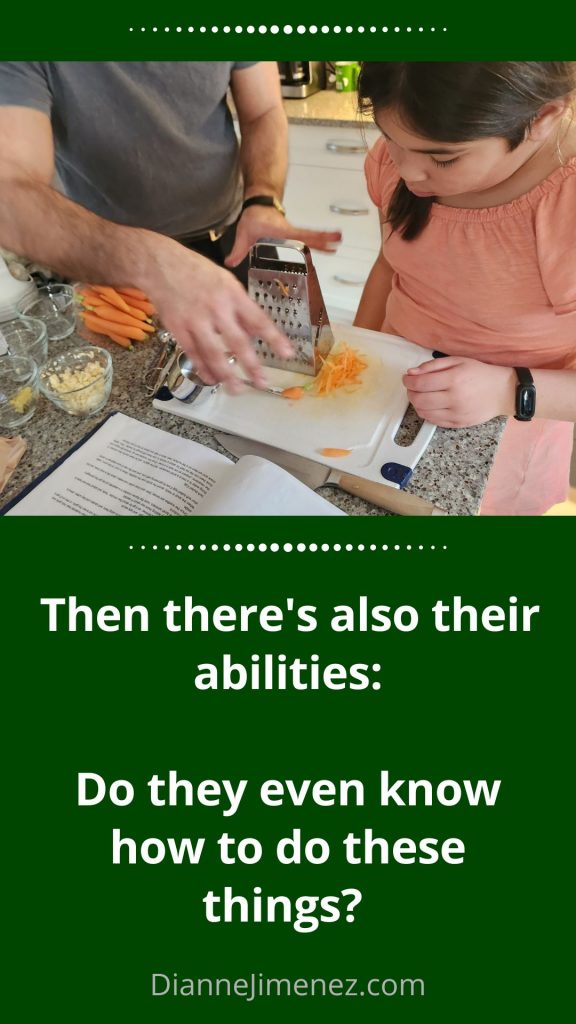Why Kids Don't Help Around the House - Throught Their Eyes
EPISODE 67

by Dianne Jimenez
This article takes 4 minutes to read
Don’t have time to read this? Listen to the podcast episode instead:
Subscribe to the
THE ORGANIZED-ISH: PARENT PODCAST
and never miss a bonus episode!
Why Kids Don’t Help Around the House – Through Their Eyes
Why Don’t Kids Help at Home? Analyzing Internal and External Factors
In this video, I delve into the reasons why kids may not listen or help out at home. I explore various internal and external factors, including their influences, environment, focus, and abilities. I also discuss the role of parents and how different parenting styles and schedules can impact children’s behavior. Join me as I share my insights—although I’m not a certified psychologist—based on personal observations and experiences. If you’re struggling with these issues, I hope this video provides you with some clarity and potential strategies for improvement.
The episode at a glance:
[00:00] Best way to consume this content & Introduction: Why Kids Don’t Listen
[01:22] Exploring External Factors
[02:42] Understanding Internal Factors
[03:55] Parental Influence and Communication
[06:16] The Role of Both Parents
[09:56] Combining All Factors
[11:24] Conclusion and Next Steps
Are Toys Taking Over Your Home? Reclaim Your Space - NOW
Unlocking Cooperation at Home: Why Kids Don’t Help Around the House and How to Inspire Change
In the bustling rhythm of modern family life, parents often find themselves at their wits’ end, wondering why their kids don’t readily help around the house. It’s a dilemma that spans households and generations, and today, I want to explore the root causes of this common issue and share some insights that might just turn the tide in your home.
One casual day, this question pierced through my thoughts: Why do kids seem so reluctant to help around the house? As I mulled over it, I realized that the answers lie within a complex web of influences, both external and internal to the child, as well as the dynamics between parents themselves.
find out how families with 3+ kids tackle the beast: laundry!
Are They Not Helping, Or Are We Not Understanding?
The initial question naturally spiraled into deeper questions: Is it the kids themselves? Is it us, the parents? Is it our partner who’s perhaps doing things differently? Or is it a blend of all of these factors? To gain clarity, and what I normally tend to do is to lay everything out on the “table” to dissect these possibilities further.
The Outside Influences
Firstly, let’s consider the external factors affecting our kids. They are constantly navigating through a sea of influences, from friends to technology, each competing for their attention. Their schedules brim with activities, limiting their capacity to help around the house. Add to that their living environment—the very dynamic which governs how they perceive responsibility.
It’s essential to acknowledge these outside pressures. In today’s world, numerous distractions compete for their attention, and it’s our job as parents to guide them through these challenges with patience and understanding.
My Secret Sauce for setting the kids up for success
The Internal World of Our Children
Then there’s the inner emotional and cognitive landscape of our children. How do they interpret our instructions? Are they able to focus and maintain that focus when completing tasks? Do they possess the necessary skills and confidence to undertake responsibilities?
It’s crucial to debunk the myth of laziness here. Often, what we perceive as inertia is actually a deeper struggle with comprehension and ability. Encouragingly, this is where we can make significant strides by fostering an environment of learning and growth.
Parent Dynamics: Setting the Example
As parents, our influences run deep. Children often emulate our behaviors, picking up on the nuances of our communication styles, our prioritization, and even how we manage our time. They observe our roles in household maintenance and form their perceptions accordingly.
3 things to establish now before losing your s#!t later on (during the school year)
Consider how your actions might reflect differently than your partner’s. Are you on the same page when it comes to discipline and chores? While unity offers consistency, differing approaches can also be beneficial if handled constructively, showcasing diverse ways of managing responsibilities.
Overcoming the Mixed Messages
Here’s a crucial point: Often, the reason kids don’t help around the house is that they’re overwhelmed by mixed signals from us, their busy parents. Our rushed schedules, contrasting expectations, and even our own relationship dynamics can cloud their understanding of what’s needed from them.
However, don’t lose hope. Every challenge brings an opportunity for clarity and growth. Addressing this issue involves creating a cohesive strategy that acknowledges these influences and nurtures both you and your child’s journey to cooperation.
Free training: "How to find time in a busy schedule"
A Path Forward: Strategies to Encourage Participation
As a home organizer and a mother of three. My mission is to help parents like you organize their homes, reclaim their time, and empower their children to help around the house as active participants.
I’ve developed a proven approach grounded in four pillars:
- Parent Partnership: Aligning goals and strategies with your partner is crucial. Start by having open conversations about your expectations and work towards a unified approach to home responsibilities.
- Personal Organization: Assess and revamp your own schedule to make space for impactful interactions with your kids. Show them the importance of time management as a life skill.
- Home Environment: Arrange your home in a way that naturally encourages organization. A well-thought-out space simplifies chores and directs your child’s focus effortlessly.
- Family Partnership: Unite as a family to outline responsibilities together. This collective approach promotes understanding and ensures everyone is pulling in the right direction.
By adopting these strategies, you can transform your home into a place where everyone helps around the house, allowing more time for joy and less stress.
Stay on track with laundry & tips to getting the kids involved
Conclusion
Parenthood is a journey of learning, both for us and our kids. The path to harmonious home cooperation is paved with patience, understanding, and consistent effort. Remember, it’s not about achieving perfection but fostering an environment where everyone feels like a valued part of the family unit.
If this resonates with you and you’re curious to learn more or seek personalized guidance, I invite you to reach out. Whether it’s for a chat over email or diving into an impactful one-on-one session, I’m here to support your journey toward a balanced, organized, and cooperative family life.
Thank you for reading, and here’s to nurturing homes where everyone helps around the house with enthusiasm and mutual respect.
Request Transcript / Listen on Apple Podcast / Listen on Spotify / Watch on YouTube

Referenced in this episode
- Need help with any of this? Let me know at info@diannejimenez.com
- To see know more about my 4 pillars, visit my site
Can you think of someone who would also benefit from reading this?
Send it to them:

